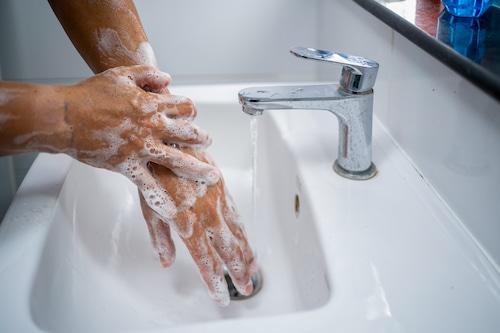It’s likely that you heard of someone who was, as they say, “as sick as a dog” with a really upset stomach if you spent the holiday season with friends or family.
Norovirus, the dreaded and infectious stomach ailment that seems to be spreading throughout the northeast in recent weeks, is the culprit.
Although precise state-by-state figures are unavailable because state and local health departments are not obligated to report individual cases of norovirus illness to the federal agency, the Centers for Disease Control and Prevention reports that the northeast is seeing a rise in positive cases of the illness.
The CDC reports that during the week of December 5, the most recent week for which data is available, there were over 90 norovirus outbreaks.
Physicians in central Pennsylvania also report an increase in instances.
As with all viral diseases, noroviruses are resistant to antibiotics, according to Pennsylvania Department of Health officials.
According to department experts, nausea, vomiting, diarrhea, and occasional stomach cramps are typical signs of norovirus disease. In addition, patients can experience chills, headaches, muscular aches, low-grade fever, and overall fatigue. The afflicted individual may feel extremely poorly, and the illness frequently starts abruptly.
One of the most crucial things to remember about norovirus is that if someone in your immediate circle contracts it, you are likely to contract it as well, according to Dr. John Goldman, an infectious disease specialist at UPMC in central Pennsylvania.
According to him, norovirus is a very contagious gastroenteritis. In addition to having pretty severe diarrhea virtually all the time, it also frequently causes a lot of vomiting, which sets it apart from other viruses that are prevalent during this season. Therefore, a person with a classic neurovirus usually experiences nausea, vomiting, and a lot of diarrhea.
There are two main ways that norovirus spreads: through the air or through feces or oral infection.
According to Goldman, the virus is difficult to eradicate since it is so resilient. For instance, you can use alcohol or hand sanitizer to kill most viruses, including the COVID and flu viruses. Alcohol does not destroy norovirus. Relatively high temperatures do not kill it, and it can live for days or weeks on surfaces.
You could get the virus from air droplets if you are caring for a sick youngster.
According to Goldman, people aerosolize tiny vomitus particles when they throw up. Because you infect yourself by breathing in the vomitus, you can contract it by flying.
This is the primary cause of the illness’s rapid spread throughout a family.
For individuals who are ill, there is good advice on how to avoid and even expedite their recovery.
Hand cleaning properly is essential. as when you wash a lot with soap and water.
According to Goldman, using hand sanitizer alone won’t work. Additionally, you must genuinely wipe down. Suppose you have a child who has just puked all over the bathroom. You must clean up.
Goldman advises caregivers to wear gloves and, in the event that the patient is vomiting, a mask.
Use a bleach solution to clean the surfaces in the bathroom.The majority of household cleansers won’t be sufficient to combat the infection.
Washing the clothes is ideal, but you probably won’t bleach them, which emphasizes how contagious norovirus is.
The majority of people who contract the norovirus range from having no symptoms at all to having a severe episode of fever, nausea, and vomiting.
Those 65 and older, infants under one year old, and those with compromised immune systems are the groups most likely to wind up in the emergency room.
Dehydration causes many kids to wind up in the hospital.
Adults should take anti-diarrhea medications, whether they are prescribed or over-the-counter, according to Goldman.
He also suggests drinking a lot of fluids, such as Gatorade or something with electrolytes, rather than just water. Additional choices include broth, chicken soup, water, and even pretzels or potato chips.
Goldman remarked, “It’s one of the few times we’re going to advise people to have a lot of salt.”
The good news is that norovirus usually goes away quickly after 48 hours. Because norovirus tends to run in a season, most people who get sick won’t likely get sick again in the same year. However, they may become ill once more the next year.
According to Goldman, there are a lot of norovirus-related outpatient cases at UPMC. Adults are rarely involved; children are in most cases.
One of Goldman’s most pressing recommendations deals with the “epideeism epidemic.”
Unless they’re dead or in the hospital, people usually go to work or school, he said. This virus spreads easily. It is therefore better to stay at home if you believe you have it, even if it is in its early stages, even if you believe you can go to work, school, or send the child to daycare.
More health news
Note: Every piece of content is rigorously reviewed by our team of experienced writers and editors to ensure its accuracy. Our writers use credible sources and adhere to strict fact-checking protocols to verify all claims and data before publication. If an error is identified, we promptly correct it and strive for transparency in all updates, feel free to reach out to us via email. We appreciate your trust and support!

